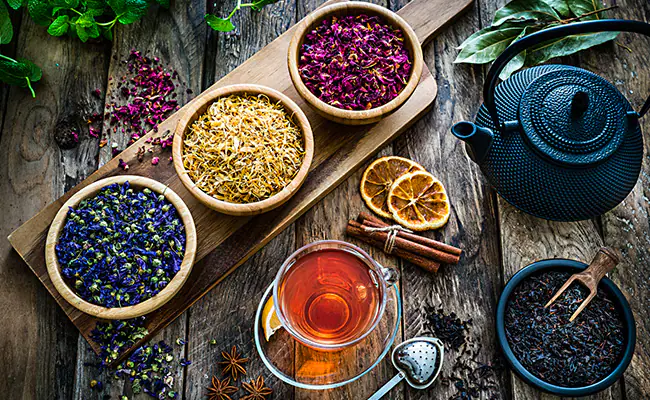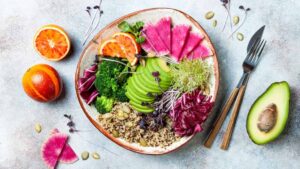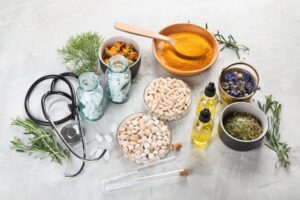Herbal teas have long been a trusted remedy for promoting wellness, offering a gentle and natural approach to calming the body and supporting overall health. Each cup is a blend of flavor, tradition, and therapeutic benefits, making it one of the simplest ways to care for both your mind and body.
This post will guide you through the world of herbal teas, their unique benefits for mind and body, and how to brew them for maximum effect. Plus, we’ll share tips on how to seamlessly incorporate them into your daily routine.
What Are Herbal Teas and Why Are They Beneficial?
Unlike traditional teas derived from the Camellia sinensis plant, herbal teas are made from a variety of herbs, flowers, fruits, and spices. Each ingredient serves a specific purpose, offering therapeutic properties that address physical and emotional well-being. From calming stress to easing digestion or helping you wind down for the night, herbal teas are a simple but powerful addition to your self-care toolkit.
The Best Herbal Teas and Their Benefits
1. Chamomile Tea
Benefits:
Known as the ultimate bedtime tea, chamomile helps with:
- Relaxation and stress relief.
- Better sleep quality.
- Mild digestive discomfort.
Chamomile contains apigenin, a compound that binds to receptors in the brain to promote sleepiness and reduce insomnia.
How to Brew:
- Use one teaspoon of dried chamomile flowers per cup of boiling water.
- Steep for 5–7 minutes.
- Enjoy plain or with a drizzle of honey.
Precautions:
Avoid chamomile if you’re allergic to plants in the daisy family (e.g., ragweed).
2. Peppermint Tea
Benefits:
Peppermint tea isn’t just refreshing; it’s packed with health benefits, including:
- Relieving digestive issues such as bloating and discomfort.
- Easing headaches.
- Boosting mental clarity and focus.
Its menthol content provides a cooling sensation that soothes the digestive tract and reduces muscle tension.
How to Brew:
- Add 3–4 fresh peppermint leaves (or 1 teaspoon dried leaves) to a cup of boiling water.
- Steep for 8–10 minutes, depending on desired strength.
Precautions:
If you have acid reflux, peppermint tea might make symptoms worse.
3. Lavender Tea
Benefits:
Lavender is well-loved for its calming properties, helping with:
- Reducing anxiety and promoting relaxation.
- Improving sleep patterns.
- Easing menstrual discomfort.
The aromatic compounds in lavender interact with the nervous system, reducing stress hormone levels and inducing calm.
How to Brew:
- Use one teaspoon of dried lavender flowers.
- Pour over boiling water and steep for 5–10 minutes, depending on your flavor preference.
Precautions:
Lavender tea can interact with certain medications like sedatives. Consult your doctor if unsure.
4. Ginger Tea
Benefits:
Ginger tea is a zesty powerhouse with benefits including:
- Alleviating nausea and morning sickness.
- Reducing inflammation and joint pain.
- Supporting digestion.
Gingerol, the main bioactive compound in ginger, has powerful antioxidant and anti-inflammatory effects.
How to Brew:
- Slice a 1-inch chunk of fresh ginger.
- Boil the slices in water for 10 minutes.
- For added warmth, include a dash of cinnamon or squeeze in some lemon juice.
Precautions:
Ginger tea can thin the blood, so it’s best to limit consumption if you take blood-thinners.
5. Rooibos Tea
Benefits:
With its rich, nutty flavor, rooibos is an excellent caffeine-free alternative for:
- Supporting heart health (high antioxidant content).
- Easing allergies (anti-inflammatory benefits).
- Promoting clear skin.
Rooibos is unique in that it contains no tannins, making it less bitter and more soothing than most herbal teas.
How to Brew:
- Use one teaspoon of rooibos leaves per cup of boiling water.
- Steep for 5–7 minutes and enjoy its naturally sweet flavor.
Potential Side Effects and Precautions
While herbal teas are generally safe, some may cause mild side effects. Key things to watch out for include:
- Allergies: Certain teas, like chamomile or lavender, can trigger allergic reactions in sensitive individuals.
- Medication Interactions: Many herbal teas can interact with blood thinners, sedatives, or other prescriptions. Always consult with a healthcare provider if unsure.
- Pregnancy Considerations: Pregnant individuals should limit or avoid certain teas like peppermint and chamomile.
How to Incorporate Herbal Teas into Your Daily Routine
- Morning Pick-Me-Up: Start your day with a cup of stimulating peppermint or ginger tea instead of coffee.
- Mid-Day Reset: Sip on rooibos for a gentle energy boost without caffeine crashes.
- Unwind in the Evening: Brew a calming cup of chamomile or lavender to wind down before bedtime.
- Teatime Rituals: Schedule a mindfulness moment in your routine where you sit down and savor your tea without distractions.
Quick Chart for Reference
|
Herbal Tea |
Key Benefits |
Precautions |
Ideal Brewing Time |
|---|---|---|---|
|
Chamomile |
Sleep aid, stress relief |
Allergy considerations |
5–7 minutes |
|
Peppermint |
Digestive aid, mental clarity |
May worsen acid reflux |
8–10 minutes |
|
Lavender |
Anxiety reduction, sleep improvement |
Interactions with sedatives |
5–10 minutes |
|
Ginger |
Anti-inflammatory, nausea relief |
Blood thinning effects |
10 minutes |
|
Rooibos |
Heart health, antioxidant boost |
Generally considered safe |
5–7 minutes |
FAQs About Herbal Teas
Q1. Can I mix herbal teas together?
Absolutely! Mixing teas like chamomile and lavender can create a soothing blend, while combining ginger and peppermint offers digestive benefits.
Q2. How much herbal tea is safe to drink per day?
Generally, 2–3 cups a day is safe for most people. Be mindful of your body and adjust intake as needed.
Q3. Are herbal teas caffeinated?
Most herbal teas are naturally caffeine-free, making them great for individuals avoiding caffeine.
Rediscover Wellness, One Cup at a Time
There’s a world of wellness in every cup of herbal tea. Whether you’re seeking better sleep, improved digestion, or simply a moment of calm in your day, there’s a perfect blend out there for you.
Start experimenting with different teas to find what works best for your body and lifestyle. And if you’re ready to elevate your tea game, consider investing in organic, high-quality options for the purest experience.
Grab a cup, take a sip, and enjoy the benefits of nature’s age-old remedy.




